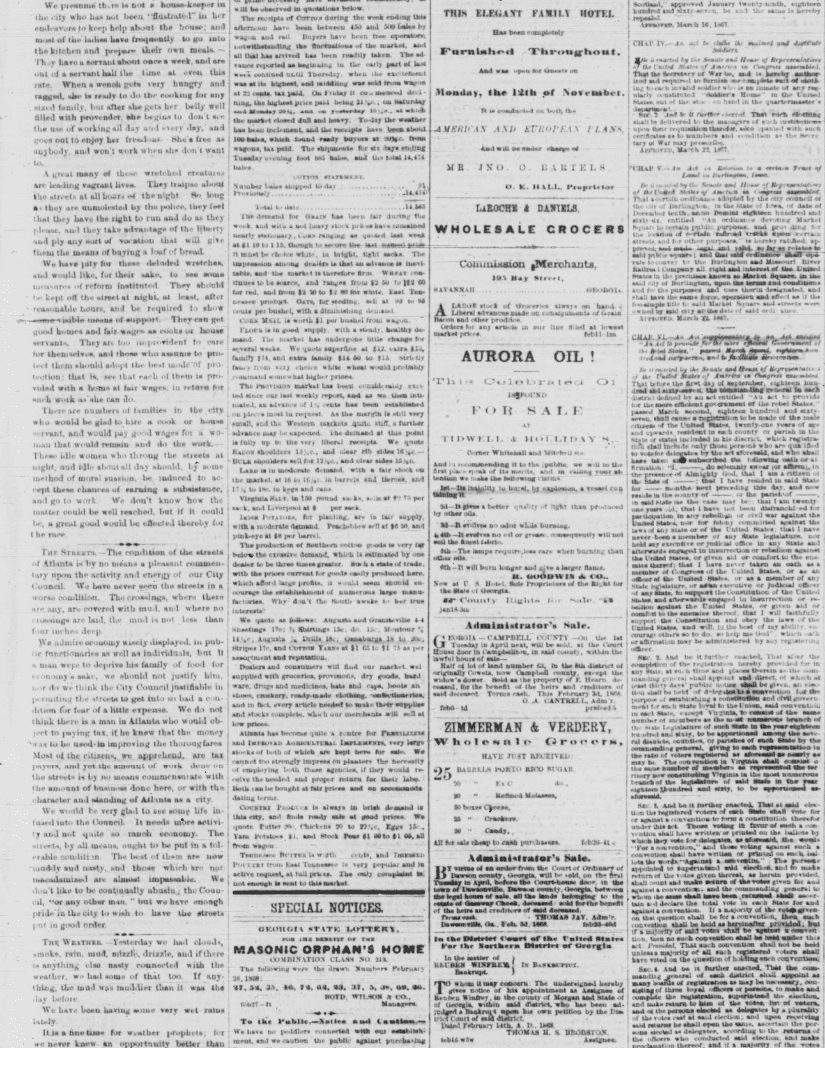Document Text |
Summary |
| Domestic Dramas – In these days of untranquility, next to the difficulty of provisioning a family comes the difficulty of procuring some one to cook the provisions. The ladies from Africa have mostly concluded to conduct establishments of their own, and, consequently, with a large number of the able-bodied among them, the order of the day is to sleep and shiver at home in any sort of a hovel or hut that offers an apology for a shelter, and the order of the night is to “ply their vocation” about the streets, in violation of all the rules of decency and good order. | On top of post war chaos, white housewives are struggling because they no longer have enslaved women to cook and clean for them. Many Black women now choose to take care of their own homes, rather than working for white women. Most are engaged in sex work and have filthy homes. |
| We presume there is not a house-keeper in the city who has not been “flustrated” in her endeavors to keep help about the house; and most of the ladies have frequently to go into the kitchen and prepare their own meals. They have a servant about once a week, and are out of a servant half the time at even this rate. When a wench gets very hungry and ragged, she is ready to do the cooking for any sized family, but after she gets her belly well filled with provender, she begins to don’t see the use of working all day and every day, and goes out to enjoy her freedom. She’s free as anybody, and won’t work she she don’t want to. | White women in Atlanta have no reliable servants to help around the house and often have to cook meals themselves. Black women are to blame. They only work when they are desperate, and they spend too much time enjoying their freedom. |
“Domestic Drama”, transcription, Atlanta Daily New Era, February 27, 1868. Georgia Historic Newspapers.
Background
The end of slavery did not mean the end of racism and systemic oppression of Black people in the United States. White supremacists did everything in their power to stop Black people from being treated as equal members of society. In the early years of Reconstruction, white supremacists continued to spread the idea that Black people could not be productive members of society except as slaves. They claimed that Black people were naturally greedy, lazy, and unmotivated.
About the Document
This article appeared on the front page of an Atlanta newspaper three years after the end of the Civil War. The author complains that white families can no longer rely on steady work from Black women and hints they are all sex workers and indecent. The author also blames Black women for the decline of the city. This kind of racism was part of a white supremacist campaign to keep Black women from achieving stability and success in the Reconstruction era.
Vocabulary
- establishments: Homes.
- hovel: A small, dirty house.
- “ply their vocations”: Sell sexual acts.
- procuring: Hiring.
- provender: Food for animals.
- provisioning: Buying the food needed for a home.
- Reconstruction: The years between 1865 and 1877 when the federal government actively sought to reincorporate the former Confederacy back into the United States and integrate Black Americans into the nation’s economics, politics, and society.
- sex worker: A person who makes money engaging in sex acts.
- stereotype: An oversimplified and often prejudiced opinion formed by one group of people about another.
- systemic oppression: The embedded mistreatment of a group of people by a society and its institutions.
- “untranquility”: Chaos.
- wench: A derogatory word for a woman.
- white supremacist: A person or group of people who believe that white people are superior to all other races. White supremacists take drastic and sometimes violent actions to make sure people of other races do not achieve equality with white people.
Discussion Questions
- How does the author characterize Black women workers?
- Why does the author hint that Black women are all sex workers?
- What does this author want the government to do?
- What does this article teach us about attitudes toward Black women workers in the Reconstruction era?
Suggested Activities
- APUSH Connection: 5.11 Failure of Reconstruction
- Include this article in any lesson about the racism Black people faced in the Reconstruction era.
- Invite students to write a letter to the editor about the harmful stereotypes perpetuated by this article. They can use any of the following resources to provide evidence for their arguments: Life Story: Sojourner Truth, Life Story: Harriet Tubman, Life Story: Louisa Smith, Laundry Workers: Tools of the Trade, “All Bound Up Together”, Calling Out Sexual Violence, Claiming Political Power, Washer Women’s Strike, Life Story: Matilda Hughes, Life Story: Susie Baker King Taylor, Nancy Cunningham Luckie, and Elizabeth Keckley.
- To learn more about the role white women played in reinforcing white supremacy in the Reconstruction era, ready the life story of Ella Gertrude Clanton Thomas.
- To learn more about how Black women advocated for their rights as workers, read Washer Women’s Strike.
- To learn more about the challenges and opportunities Black Americans encountered after the end of the war, explore any of the following: “All Bound Up Together”, Information Wanted, Luckie Family Portraits, Calling Out Sexual Violence, Claiming Political Power, Laundry Workers’ Strike, Life Story: Matilda Hughes, and Life Story: Susie Baker King Taylor.
Themes
WORK, LABOR, AND ECONOMY
New-York Historical Society Curriculum Library Connections
- For more about the racism and oppression faced by Black workers in the Reconstruction era, see Black Citizenship in the Age of Jim Crow.







